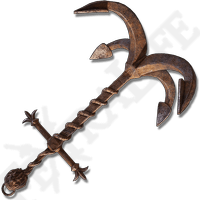Warping is throwing an anchor either manually for a small ship or by rowing the anchor out and dropping it farther away for a larger ship. Then the ship would reel it to change position. Good for maneuvering in harbor. Etymologically related to “throwing” and essentially threading a needle across the sea.
Warp factor get you asses in the rowboat. Engage.
Pipe lay (etc) anchor barges do this today.
There are usually six to 8 anchor winches on the vessel. A tug comes to the barge, picks up the anchor and moves it out to some point while the winch unreels. Repeat for other anchors. Winch in to move the vessel.
This is used for precision movement/placement of the barge.
Many vessels use azipods and Dynamic Positioning System (DPS) these days.
But before DPS much of offshore infrastructure was placed by anchor barges.Those vessels have truly advanced warp drives.
Depends on the quality of the dilithium crystals…

Sounds like a lot of work. I have no idea how heavy a ship’s anchor is, but I imagine it would be hard to throw any significant distance.
But where did they get the dilithium?
Two lithium rocks
I’ve been kedging for hours and I still don’t think I’m close
Imagine actually moving like this. “Here little ship, take our anchor, we can move another 100 meters and only have to repeat a million times”
How does one “throw” an anchor tho
If you do it in water it’s not as heavy.
For smaller boats, you throw an anchor with your hand like this.
Just have 26 STR and 9 DEX.

Try piercing but hole.
simply put it into a canon.
Does one simply throw a boat anchor with a cannon??
We’ll just use a howitzer to launch the ring into mount doom.
Hear me out
Trebuchet
I would definitely like to see a ship propel itself using a trebuchet and a windlass. Not enough to try building one, but still.
I bet you could get a bunch of money for a CGI prototype of your new green cargo ship.
Doesn’t this defy the laws of physics?
I’ve got a really wild idea: what if you change the shape of the anchor so that it’s actually getting resistance against the water itself instead of having to hit the sea floor. You’ll have to pull it out if the water once you’re done moving it and then drop it in again. Maybe put it on the end of a big stick. I’m thinking about calling this type of anchor an “oar.”
A trebuchet primarily transforms downward motion (of the counterweight) into forward motion, so it would actually work - the trebuchet doesn’t push the ship back as much as it pushes its load forward. This is particularly so if your trebuchet has wheels and you have room on your ship to accommodate it rocking back and forth when firing.
i would presume that would be what one is to do. It seems the logical solution here.
A very strong Scottish guy
I’m a little sad that I didn’t get to see the HMS Enterprise with warp nacelles.
The rope attached to the anchor chain is called the “warp”. Hence warping.
Wait till he hears about looms!
Hey warp and weft is why I mentioned threading a needle across the sea.
Have to admit, after reading the title I double checked the community for ‘onion’!
“Prepare to travel by warp.”
“Captain, that will set us back days!”
something-something dimensional anchor
Commencing the naval operation by tooting my Warp Whistle
Thank you Boatswain Underpants. Keep up the good work.
Would love to hear an expert talk be about this more. It’s an interesting idea, but seems like it would be limited in usefulness to small adjustments.
I guess it would be valuable in shallow water, less useful in the deep ocean, and overall better than being stuck in one place!
Yeah me too. I tried searching around but it’s hard to find something that’s not sci-fi related about this topic. It might also be called “kledging” from what I read, but not sure if that’s the exact same thing.
As a sailboat enthusiast kedging is most often used as in the case of poor Blackbeard when you get caught up on something and need to move a small bit in a direction that’s against the wind or water. So usually just trying to get unstuck when you’ve run afoul of hidden sand bars or the tide shift leaves you in an awkward spot. You also might do it to help set an extra anchor if you’re worried about drifting on the tides.
Even deep water boats only have a few hundred feet of anchor rode and line and it takes a while and is a hassle to kedge out with your dinghy.
I have never in all my years of boating seen anyone do it as a method of general propulsion outside of just handling lines at the dock. It’s just sometimes your best shot.
I had no idea this had a name! When I was a small child we lived by the coast and my dad had a small yacht, one day I remember the keel lodged on a sandbar and he used the anchor to pull it free. Unfortunately we moved inland when I was 5 and dad sold the yacht.
I stumbled on it when figuring out just how the hell tall ships docked and undocked without tugs. Turns out they did use tugs in the form of rowboats but they also extensively used shoreside rigging and warping.
This also bugs me in movies whenever someone is kicked off the boat, but they’re given a small rowboat and some provisions. Like, that wasn’t an extra boat. It serves a purpose on the ship, and everything that takes up space on a boat is precious. A “spare” rowboat could be the difference between life and a horrible death. It could be months before they find a port where they can buy a replacement rowboat.
Hence the use of islands
This is something to propose for Wikipedia’s April 1st front page…








